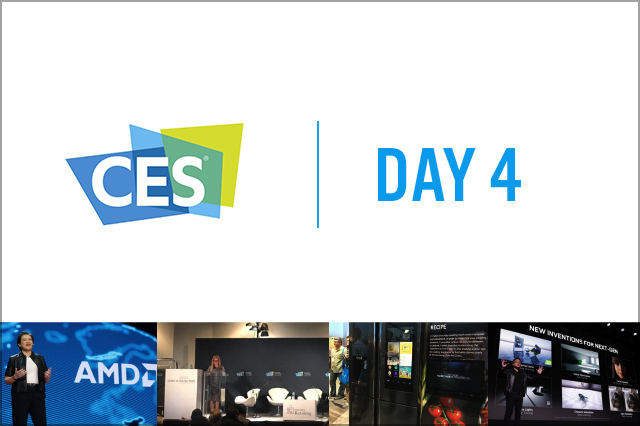
albert Chan
1. The microprocessor industry is currently at an inflection point and poised to help solve some of society’s most serious challenges.
AMD is currently giving Intel serious competition in the microprocessor wars, and announced several new processors — for desktops, servers, mobile and graphics — and AMD says this increased computing power will be needed to solve society’s challenges in education, healthcare, climate change and energy. In a keynote address, company CEO Lisa Su announced a suite of products that feature 7nm feature widths in their designs, smaller than the 10nm product that Intel announced this week (narrower is better).
[caption id="attachment_60178" align="aligncenter" width="654"]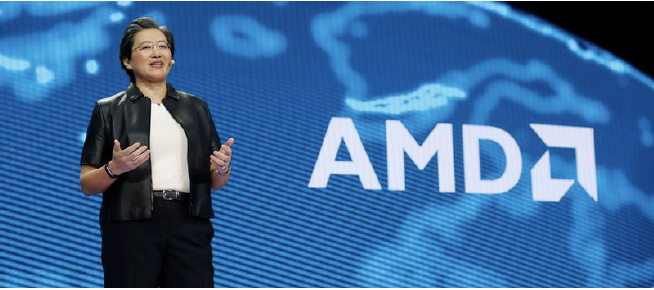 Source: https://finance.yahoo.com/news/amd-shows-off-7nm-next-201932052.html[/caption]
2. Panasonic is developing the insides and interiors for the vehicles of the future.
Panasonic considers itself a systems company, however, the company demonstrated modules and interiors for futuristic vehicles. The company showed a 48V drivetrain for future autonomous vehicles, which can carry people, serve as portable healthcare systems and make deliveries. Panasonic also showed a design for the interior of an autonomous vehicle, which offers two pairs of facing seats with all the comforts of home and which can show video on the inside windows of the vehicle.
[caption id="attachment_60179" align="aligncenter" width="654"]
Source: https://finance.yahoo.com/news/amd-shows-off-7nm-next-201932052.html[/caption]
2. Panasonic is developing the insides and interiors for the vehicles of the future.
Panasonic considers itself a systems company, however, the company demonstrated modules and interiors for futuristic vehicles. The company showed a 48V drivetrain for future autonomous vehicles, which can carry people, serve as portable healthcare systems and make deliveries. Panasonic also showed a design for the interior of an autonomous vehicle, which offers two pairs of facing seats with all the comforts of home and which can show video on the inside windows of the vehicle.
[caption id="attachment_60179" align="aligncenter" width="654"]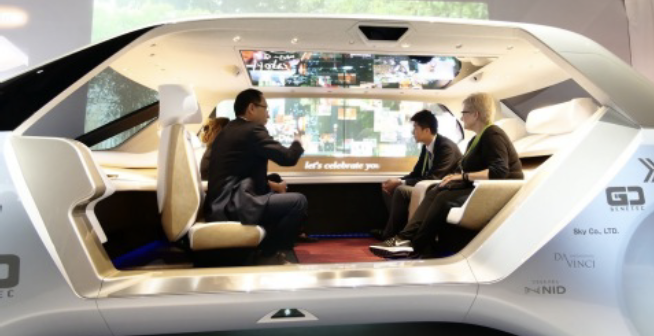 Source: Businesswire.com[/caption]
3. Artificial intelligence underlies all aspects of the CORE of the retail ecosystem.
Coresight Research Founder and CEO Deborah Weinswig offered remarks on the aspects of AI in the retail ecosystem, based on the proprietary “CORE” framework; this represents Communication, Optimizing prices, Rationalizing Inventory and Experiential retail. AI can be used for communication in the form of personalization, chatbots and voice recognition. It is also used for business optimization to create promotions, deal with competition and offer dynamic pricing. AI can also rationalize inventory, and plan, allocate and audit resources. Finally, AI can be used to create experiences, where consumers discover, engage shop and pay. Weinswig concluded her remarks with eight things we can learn from China, which can be combined to offer “Spectacular Retail.”
[caption id="attachment_60180" align="aligncenter" width="648"]
Source: Businesswire.com[/caption]
3. Artificial intelligence underlies all aspects of the CORE of the retail ecosystem.
Coresight Research Founder and CEO Deborah Weinswig offered remarks on the aspects of AI in the retail ecosystem, based on the proprietary “CORE” framework; this represents Communication, Optimizing prices, Rationalizing Inventory and Experiential retail. AI can be used for communication in the form of personalization, chatbots and voice recognition. It is also used for business optimization to create promotions, deal with competition and offer dynamic pricing. AI can also rationalize inventory, and plan, allocate and audit resources. Finally, AI can be used to create experiences, where consumers discover, engage shop and pay. Weinswig concluded her remarks with eight things we can learn from China, which can be combined to offer “Spectacular Retail.”
[caption id="attachment_60180" align="aligncenter" width="648"]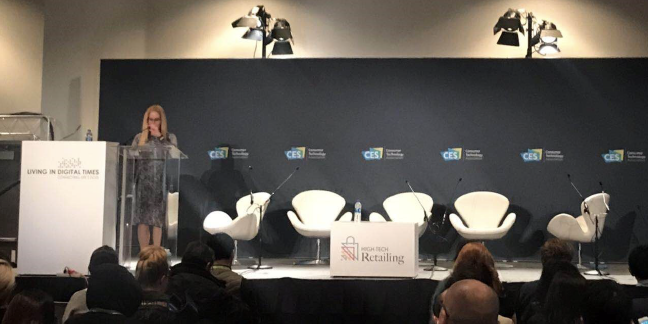 Source: Coresight Research[/caption]
4. Your appliances are rapidly gaining intelligence to improve your life.
Appliances were a major focus of CES with major manufacturers such as LG and Samsung showing off refrigerators with internal cameras that can monitor the amount food inside and provide alerts when the consumer runs low. These high-tech ice boxes can even create recipes based on the refrigerator’s contents. We also saw smart washers and dryers that can send the user a text message when he laundry is done or automatically order detergent and other supplies.
[caption id="attachment_60181" align="aligncenter" width="652"]
Source: Coresight Research[/caption]
4. Your appliances are rapidly gaining intelligence to improve your life.
Appliances were a major focus of CES with major manufacturers such as LG and Samsung showing off refrigerators with internal cameras that can monitor the amount food inside and provide alerts when the consumer runs low. These high-tech ice boxes can even create recipes based on the refrigerator’s contents. We also saw smart washers and dryers that can send the user a text message when he laundry is done or automatically order detergent and other supplies.
[caption id="attachment_60181" align="aligncenter" width="652"]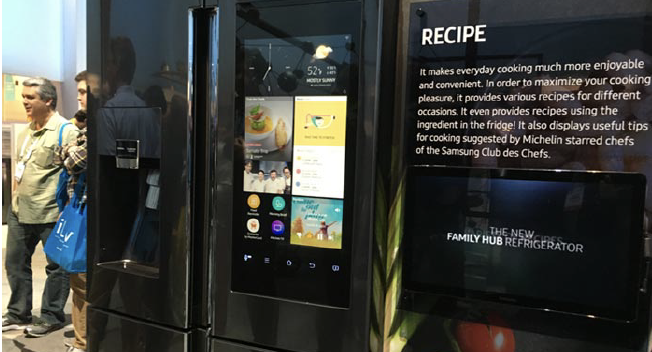 Source: Indianexpress.com[/caption]
5. Nvidia went back to its gaming roots, announcing a slew of new graphics products.
Nvidia claimed its fame as a graphic company, but the massive computing power of its graphics chips makes them excellent engines for artificial intelligence – helping the company earn a reputation in the AI space. Nonetheless, the company emphasized its core business in graphics at CES, announcing new monitor technologies, new rendering technologies for gaming, and a couple of new graphics cards for gaming that further expand the performance envelope.
[caption id="attachment_60182" align="aligncenter" width="654"]
Source: Indianexpress.com[/caption]
5. Nvidia went back to its gaming roots, announcing a slew of new graphics products.
Nvidia claimed its fame as a graphic company, but the massive computing power of its graphics chips makes them excellent engines for artificial intelligence – helping the company earn a reputation in the AI space. Nonetheless, the company emphasized its core business in graphics at CES, announcing new monitor technologies, new rendering technologies for gaming, and a couple of new graphics cards for gaming that further expand the performance envelope.
[caption id="attachment_60182" align="aligncenter" width="654"]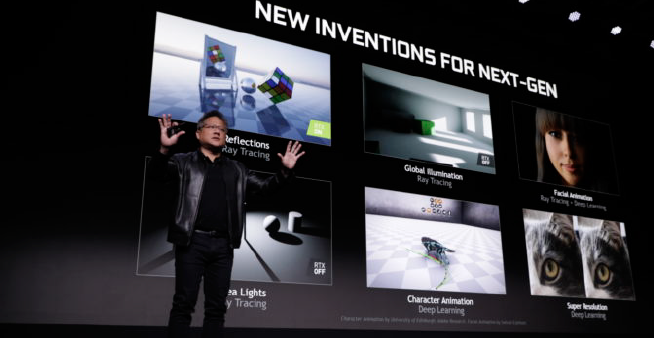 Source: Blogs.nvidia.com[/caption]
Source: Blogs.nvidia.com[/caption]
 Source: https://finance.yahoo.com/news/amd-shows-off-7nm-next-201932052.html[/caption]
2. Panasonic is developing the insides and interiors for the vehicles of the future.
Panasonic considers itself a systems company, however, the company demonstrated modules and interiors for futuristic vehicles. The company showed a 48V drivetrain for future autonomous vehicles, which can carry people, serve as portable healthcare systems and make deliveries. Panasonic also showed a design for the interior of an autonomous vehicle, which offers two pairs of facing seats with all the comforts of home and which can show video on the inside windows of the vehicle.
[caption id="attachment_60179" align="aligncenter" width="654"]
Source: https://finance.yahoo.com/news/amd-shows-off-7nm-next-201932052.html[/caption]
2. Panasonic is developing the insides and interiors for the vehicles of the future.
Panasonic considers itself a systems company, however, the company demonstrated modules and interiors for futuristic vehicles. The company showed a 48V drivetrain for future autonomous vehicles, which can carry people, serve as portable healthcare systems and make deliveries. Panasonic also showed a design for the interior of an autonomous vehicle, which offers two pairs of facing seats with all the comforts of home and which can show video on the inside windows of the vehicle.
[caption id="attachment_60179" align="aligncenter" width="654"] Source: Businesswire.com[/caption]
3. Artificial intelligence underlies all aspects of the CORE of the retail ecosystem.
Coresight Research Founder and CEO Deborah Weinswig offered remarks on the aspects of AI in the retail ecosystem, based on the proprietary “CORE” framework; this represents Communication, Optimizing prices, Rationalizing Inventory and Experiential retail. AI can be used for communication in the form of personalization, chatbots and voice recognition. It is also used for business optimization to create promotions, deal with competition and offer dynamic pricing. AI can also rationalize inventory, and plan, allocate and audit resources. Finally, AI can be used to create experiences, where consumers discover, engage shop and pay. Weinswig concluded her remarks with eight things we can learn from China, which can be combined to offer “Spectacular Retail.”
[caption id="attachment_60180" align="aligncenter" width="648"]
Source: Businesswire.com[/caption]
3. Artificial intelligence underlies all aspects of the CORE of the retail ecosystem.
Coresight Research Founder and CEO Deborah Weinswig offered remarks on the aspects of AI in the retail ecosystem, based on the proprietary “CORE” framework; this represents Communication, Optimizing prices, Rationalizing Inventory and Experiential retail. AI can be used for communication in the form of personalization, chatbots and voice recognition. It is also used for business optimization to create promotions, deal with competition and offer dynamic pricing. AI can also rationalize inventory, and plan, allocate and audit resources. Finally, AI can be used to create experiences, where consumers discover, engage shop and pay. Weinswig concluded her remarks with eight things we can learn from China, which can be combined to offer “Spectacular Retail.”
[caption id="attachment_60180" align="aligncenter" width="648"] Source: Coresight Research[/caption]
4. Your appliances are rapidly gaining intelligence to improve your life.
Appliances were a major focus of CES with major manufacturers such as LG and Samsung showing off refrigerators with internal cameras that can monitor the amount food inside and provide alerts when the consumer runs low. These high-tech ice boxes can even create recipes based on the refrigerator’s contents. We also saw smart washers and dryers that can send the user a text message when he laundry is done or automatically order detergent and other supplies.
[caption id="attachment_60181" align="aligncenter" width="652"]
Source: Coresight Research[/caption]
4. Your appliances are rapidly gaining intelligence to improve your life.
Appliances were a major focus of CES with major manufacturers such as LG and Samsung showing off refrigerators with internal cameras that can monitor the amount food inside and provide alerts when the consumer runs low. These high-tech ice boxes can even create recipes based on the refrigerator’s contents. We also saw smart washers and dryers that can send the user a text message when he laundry is done or automatically order detergent and other supplies.
[caption id="attachment_60181" align="aligncenter" width="652"] Source: Indianexpress.com[/caption]
5. Nvidia went back to its gaming roots, announcing a slew of new graphics products.
Nvidia claimed its fame as a graphic company, but the massive computing power of its graphics chips makes them excellent engines for artificial intelligence – helping the company earn a reputation in the AI space. Nonetheless, the company emphasized its core business in graphics at CES, announcing new monitor technologies, new rendering technologies for gaming, and a couple of new graphics cards for gaming that further expand the performance envelope.
[caption id="attachment_60182" align="aligncenter" width="654"]
Source: Indianexpress.com[/caption]
5. Nvidia went back to its gaming roots, announcing a slew of new graphics products.
Nvidia claimed its fame as a graphic company, but the massive computing power of its graphics chips makes them excellent engines for artificial intelligence – helping the company earn a reputation in the AI space. Nonetheless, the company emphasized its core business in graphics at CES, announcing new monitor technologies, new rendering technologies for gaming, and a couple of new graphics cards for gaming that further expand the performance envelope.
[caption id="attachment_60182" align="aligncenter" width="654"] Source: Blogs.nvidia.com[/caption]
Source: Blogs.nvidia.com[/caption]